
The Blessings of Illness
How Can Sickness Be Good for Us?
None of us want to be ill. We relish life when we are full of energy and able to conquer all of the challenges set before us. In fact, our elder brother Jesus Christ stated emphatically, “I have come that they may have life, and that they may have it more abundantly” (John 10:10).
live = zoe, “life in the absolute sense as God has it, which the Father has in Himself, and which He gave to His Son to have in Himself and which the Son manifested in the world.”
more abundantly = perissos, “abundant, advantage (Romans 3:1), superfluous (II Corinthians 9:1), what is above and over, super-added, what is superior and advantageous.”
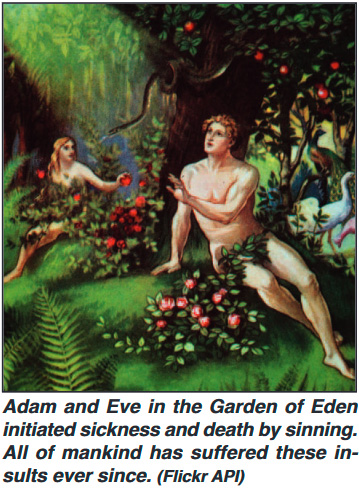 Humankind was intended to live a rich, superabundant life when he was created, like Jesus lived during his tenure on earth. I am convicted that he was never sick a day of his entire life, and neither were Adam and Eve when they lived in the Garden of Eden (Genesis 2:7-8). It was not until sin entered the lives of our first parents that aging and illness began, for illness is a symptom of aging … of dying. As Yahweh Elohim told Adam in Genesis 2:16-17,
Humankind was intended to live a rich, superabundant life when he was created, like Jesus lived during his tenure on earth. I am convicted that he was never sick a day of his entire life, and neither were Adam and Eve when they lived in the Garden of Eden (Genesis 2:7-8). It was not until sin entered the lives of our first parents that aging and illness began, for illness is a symptom of aging … of dying. As Yahweh Elohim told Adam in Genesis 2:16-17,
“Of every tree of the garden you may freely eat; but of the tree of the knowledge of good and evil you shall not eat, for in the day that you eat of it you shall surely die.
We know the story well of how Eve was deceived by the Devil to partake of the forbidden fruit, then gave some to Adam, at which point sin entered into humankind and has maintained its grip ever since (Genesis 3:1-13; Psalm 51:5). Sickness and death have consumed the lives of every human ever born, and there is no escape from that certainty in the flesh. Thus came Jesus Christ, of the seed of Adam, in due course through Abraham, to pay the price for sin through the sacrifice of Himself in order that the curse of sin — death — might be removed. That reversal of death would come through the gift of salvation through faith in the Eternal’s promise, to resurrect to eternal life those whom the Father has called and chosen (John 6:44).
The Penalty of Sin
So, we can truthfully say that illness is a result of sin which originated in the Garden of Eden. Had there been no sin there would be no aging or sickness, but rather eternal life, even in the flesh. That was the Creator’s initial design, for Adam was told directly by the Father that life would not cease as long as he ate of the many permissible trees in the Garden (Genesis 2:16-17). Moreover, Yahweh Elohim stated, after Adam and Eve had sinned, that they would live forever if they took of the Tree of Life even after sinning, thus the need to remove them from the Garden to avoid that scenario (Genesis 3:22-24). That would have granted them eternal life in sin, the very state of the Devil, in whose footsteps the Devil most certainly wanted them to follow.
We are left with a world that is immersed in sin — chata, “missing the mark” — and with it sickness and suffering. It is impossible to separate these two concepts, for in all disease (“dis-ease”) there is pain and suffering of some sort. The end of that suffering is ultimately death of the physical organism. Something goes wrong. The built-in mechanisms of immune response and healing are not able to repair the assault of pathogenic bactria, fungi, spirochetes, or other microbes upon various degenerating tissues and organs. The body’s critical functions within the circulatory, digestive, nervous, endocrine, muscular, and other systems cannot sustain life anymore, and the body’s ability to live is lost. Death gains the victory, sometimes in youth but more often in old age. As King David stated,
“For all our days have passed away in Your wrath; we finish our years with a sigh. The days of our lives are seventy years; and if by reason of strength they are eighty years, yet their boast is only labor and sorrow; for it is soon cut off, and we fly away” (Psalm 90:9-10).
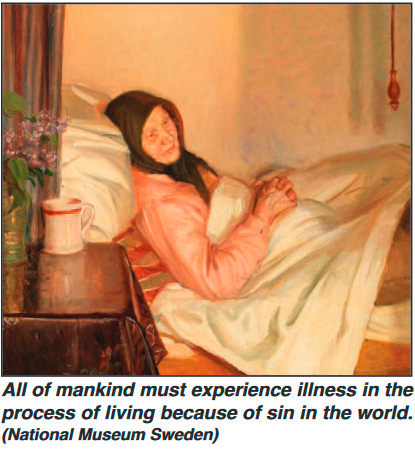 We know we must endure suffering and pain, inherent characteristics of sickness, in order to inherit eternal life. Being the children of God and joint heirs with Christ, we must “… suffer with Him, that we may also be glorified together” (Romans 8:17). These sufferings of the present time, as Paul said, “… are not worthy to be compared with the glory which shall be revealed in us” (Romans 8:18). In fact, our present lives as the elect are as good as dead — that is, our past life is crucified so that we live in newness of life as new creatures.
We know we must endure suffering and pain, inherent characteristics of sickness, in order to inherit eternal life. Being the children of God and joint heirs with Christ, we must “… suffer with Him, that we may also be glorified together” (Romans 8:17). These sufferings of the present time, as Paul said, “… are not worthy to be compared with the glory which shall be revealed in us” (Romans 8:18). In fact, our present lives as the elect are as good as dead — that is, our past life is crucified so that we live in newness of life as new creatures.
“I have been crucified with Christ; it is no longer I who live, but Christ lives in me; and the life which I now live in the flesh I live by faith in the Son of God, who loved me and gave Himself for me” (Galatians 2:20).
“Set your mind on things above, not on things on the earth. For you died, and your life is hidden with Christ in God” (Colossians 3:2-3).
“Therefore if anyone is in Christ, he is a new creation; old things have passed away; behold, all things have become new” (II Corinthians 5:17).
The Blessings of Illness
Knowing these things, what then can be the blessings of illness? Nothing that God does for us is without a righteous cause, for as Paul said, “And we know that all things work together for good to those who love God, to those who are the called according to His purpose” (Romans 8:28). Let us take a look at several of these blessings.
- Illness teaches us to number our days. “So teach us to number our days, that we may gain a heart of wisdom” (Psalm 90:12). James 4:14-15 states,
“… whereas you do not know what will happen tomorrow. For what is your life? It is even a vapor that appears for a little while and then vanishes away. Instead you ought to say, ‘If the Lord wills, we shall live and do this or that.’”
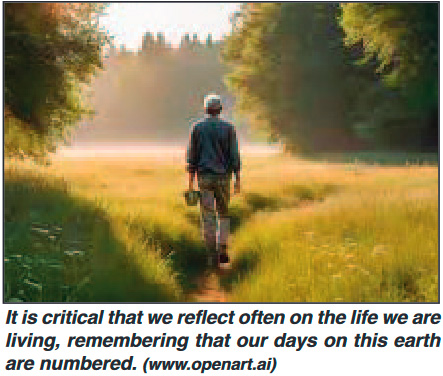 It is so easy to carry on with our daily activities — working at the office, reading the newspaper, weeding the garden, or visiting the family — and forget that our days here on earth are numbered. We must make the very best use of our time, for as Solomon said,
It is so easy to carry on with our daily activities — working at the office, reading the newspaper, weeding the garden, or visiting the family — and forget that our days here on earth are numbered. We must make the very best use of our time, for as Solomon said,
“Whatever your hand finds to do, do it with your might; for there is no work or device or knowledge or wisdom in the grave where you are going” (Ecclesiastes 9:10; see also Romans 12:11; Proverbs 10:4; 12:24).
David further enunciated the temporal state of mankind when he likened his life to that of a flower in a field:
“As for man, his days are like grass; as a flower in the field, so he flourishes, for the wind passes over it, and it is gone, and its place remembers it no more” (Psalm 103:15-16; see also Isaiah 40:6-8).
- Illness leads to spiritual growth. When lying in bed, weakened by some affliction — be it acute like a cold or infection, or chronic such as cancer or Parkinson’s Disease — a person has time to meditate upon important things in life. Consider what the brother of Jesus said in James 1:2-4:
“My brethren, count it all joy when you fall into various trials, knowing that the testing of your faith produces patience. But let patience have its perfect work, that you may be perfect and complete, lacking nothing.”
 Have you ever considered that your Creator even allows you to slip into illness for the sake of your spiritual development? Seldom do we change — i.e., repent — unless we experience suffering in order that we might examine ourselves and discover hidden sins (Psalm 19:12). We might place fasting into this same category, for it, like an illness, is very humbling … and it is this humble attitude by which we draw close to our Creator (Isaiah 66:2). Once again, King David has a lot to say on this matter:
Have you ever considered that your Creator even allows you to slip into illness for the sake of your spiritual development? Seldom do we change — i.e., repent — unless we experience suffering in order that we might examine ourselves and discover hidden sins (Psalm 19:12). We might place fasting into this same category, for it, like an illness, is very humbling … and it is this humble attitude by which we draw close to our Creator (Isaiah 66:2). Once again, King David has a lot to say on this matter:
“For You do not desire sacrifice, or else I would give it; You do not delight in burnt offering. The sacrifices of God are a broken spirit, a broken and contrite heart — These, O God, You will not despise” (Psalm 51:16-17)
broken = shabar, “to burst or break.”
spirit = ruwach, “breath, life.”
contrite = dakah, “to collapse, physically or mentally.”
heart = leb, “the heart, feelings, will, intellect.”
Illness brings low the body, mind, and spirit so the whole being can closely approach the Creator and express the fruits of the spirit (Galatians 5:22-23), by encouraging the following:
- Loosing the bonds of wickedness
- Removing heavy burdens you might be bearing
- Letting the oppressed be freed
- Breaking the heavy yoke you bear yourself or towards others
- Sharing your food with the hungry
- Bringing to your home the homeless
- Clothing the naked
- Caring for those in your own family
(Isaiah 58:6-7; see also Mathew 25:31-40).
- Illness shows us how to comfort others in their distress. After your recovery you gain empathy for others who have suffered what you have experienced. Note the plain words of II Corinthians 1:3-5:
“Blessed be the God and Father of our Lord Jesus Christ, the Father of mercies and God of all comfort, who comforts us in all our tribulation that we may be able to comfort those who are in any trouble, with the comfort with which we ourselves are comforted by God.”
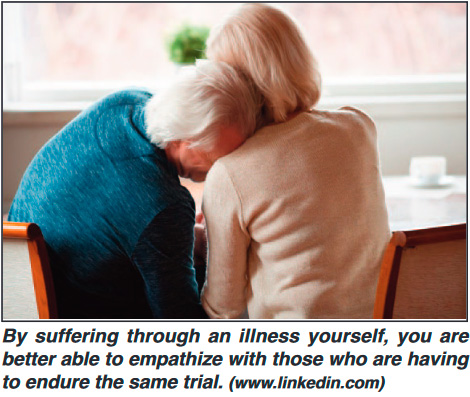 By enduring trials of sickness we are able to give encouragement to others who may experience similar distress, especially to those who are going through life-threatening diseases like cancer, heart disease, recovery from a stroke, or dialysis patients. It is no fun to be facing death during a critical life-crisis, and survivors of similar crises can comfort those who are likewise enduring trouble. Since the mind and body are so intimately intertwined, encouragement will assist the body’s immune system to throw off an illness.
By enduring trials of sickness we are able to give encouragement to others who may experience similar distress, especially to those who are going through life-threatening diseases like cancer, heart disease, recovery from a stroke, or dialysis patients. It is no fun to be facing death during a critical life-crisis, and survivors of similar crises can comfort those who are likewise enduring trouble. Since the mind and body are so intimately intertwined, encouragement will assist the body’s immune system to throw off an illness.
- Illness gives us pause to consider that we are an integral part of God’s glorious plan, and He will not forsake us (Deuteronomy 31:6; I Samuel 12:22). In spite of our decreptitude, our Creator has called us, chosen us, given us His spirit, and promised us a place in His world-ruling government on earth (Revelation 5:10; 20:4; Acts 3:19-21). Not only that, but He has promised to heal us of our infirmities through the prayers and laying on of hands of the elders “And the prayer of faith will save the sick, and the Lord will raise him up. And if he has committed sins, he will be forgiven” (James 5:14-15).
One might even say that certain illnesses are part of God’s plan to cause certain changes in our lives, to move us in a particular direction of our vocation, friendships, or spiritual walk. The illness may be a wake-up call to humble ourselves so the Eternal can draw closer to us (Isaiah 66:2). It took a sickness unto death to draw Hezekiah’s attention to the need for repentance (II Kings 20:1-6). Job was put through horrendous suffering with boils from head to foot, and the loss of his children and substance, so that, in the end, he could see who Yahweh really is: “I have heard of You by the hearing of the ear, but now my eyes see You. Therefore I abhor myself, and repent in dust and ashes” (Job 42:5-6).
David was afflicted with some sort of ailment at one point of his life, for we read in Psalm 22:14-15 that his bones were dislocated, his heart was like wax, his strength was dried up, his tongue clung to his jaws, and he was near to dying. These trials brought him to praise the Eternal more intensively. We also read in John 9:1-7 that a man born blind was healed by Jesus; the blindness was not caused by any sin of himself or his parents, “… but that the works of God should be revealed in him. What a profound change in that man’s life such healing must have caused!
- Illness is usually followed by healing, proving two things: (1) the healing power of the body made in God’s image, and (2) the power of anointing and prayer to heal. Psalm 103:3 states that Yahweh forgives all of our iniquities and heals all of our diseases, and redeems one’s life from destruction. This process is built into the human body through a marvelous array of immune and healing processes: a protective skin covering the entire body, lymphocytes, macrophages, mast cells, and other cells in the blood, the inflammation response for tissues, and on and on the list goes. Through the process of accommodation the body organs and tissues coordinate to grant the entire organism the longest possible lifespan, given the nutritional and mental tools it has.
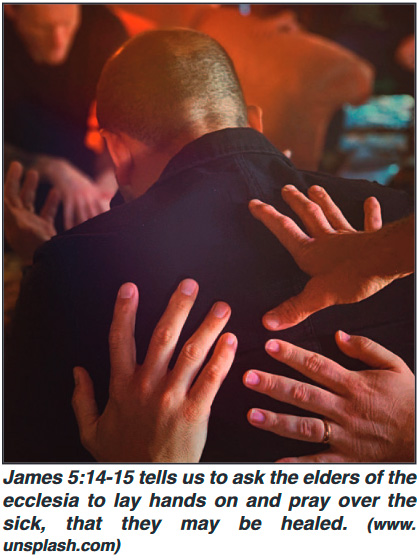 In point 4 we learned in James 5:14-15 that prayer does indeed lend to healing. Jesus numerous times commanded the sick or lame to be healed, and by His words they were indeed, such as in Matthew 8:43-44:
In point 4 we learned in James 5:14-15 that prayer does indeed lend to healing. Jesus numerous times commanded the sick or lame to be healed, and by His words they were indeed, such as in Matthew 8:43-44:
“Now a woman, having a flow of blood for twelve years, who had spent all her livelihood on physicians and could not be healed by any, came from behind and touched the border of His garment. And immediately her flow of blood stopped.”
This is just one of many healings or raisings from the dead that Jesus performed. Others are found in Matthew 8:2 (cleansing the leper); 8:5 (healing a paralytic); 8:14 (healing Peter’s mother-in-law); 9:2 (healing a paralytic); 9:18 (raising the ruler’s daughter); 9:27 (healing two blind men); 12:9 (healing a withered hand); 12:22 (releasing a blind and mute man from a demon); 15:21 (healing the gentile woman’s daughter); 17:14 (healing the epilithic boy); 20:30 (healing two blind men); others in Mark, Luke, and John.
Lazarus was raised from the dead (John 11:42-44), as was the widow’s son by Elijah at Zarephath (I Kings 17:17-22) and the Shunammite woman’s son by Elisha (II Kings 4:27-36). Sickness can be overcome by the hand of the Almighty to reward attitudes of repentance and forgiveness, such as when Hezekiah turned his face toward the wall and prayed:
“Remember now, O Lord, I pray, how I have walked before You in truth and with a loyal heart, and have done what is good in Your sight” (II Kings 20:3).
Isaiah, who had pronounced Hezekiah’s upcoming death, was prompted by Yahweh to return to him and tell him, because of his prayers and tears he would be given 15 more years of life. A poultice of figs was laid on his boil and he recovered.
Our heavenly Father can and will heal according to His will. We have to accept what that will is.
- Illness should move us to examine the causes of our sickness, and repent of habits that are conflicting with excellent health. After all, the body is the temple of God, and there is no illness in that temple (I Corinthians 6:19-20). The normal state of the human body is to be in excellent, extuberant health, even as Paul stated in III John 2, “Beloved, I pray that you may prosper in all things, and be in health [hugianine, ‘healthy, well’], just as your soul prospers.” We have already discussed how Adam and Eve were in superb health in the Garden of Eden, where aging and sickness were unknown. Only with the entrance of sin did illness and aging begin, when access to the Tree of Life was cut off (Genesis 3:22).
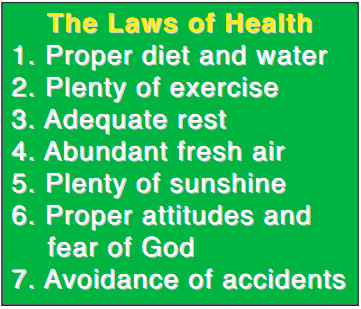 There are many things a person can do to help the body heal from illness, and becoming ill ought to give us pause to analyze where we fall short. The laws of health include proper diet, exercise, sleep, sunshine, fresh air, positive thinking, and avoidance of accidents. Neglecting any of these will lead to physical, mental, and spiritual infirmities. Connections between sickness and eating refined, adulterated, unclean, and stale foods are well established. If you find you are consuming such fare, then repent and eat only clean meats, and wholesome, whole, and fresh fruits and vegetables. If exercise has been lacking, then dive into a program to build bodily strength and endurance. If sleep is impaired by worry or some other cause, correct those problems and rest well. Get out into the fresh air and sunshine such as gardening or walks through parks afford. Cast out evil and stressful thoughts and replace them with the thoughts that Paul shows us to exercise:
There are many things a person can do to help the body heal from illness, and becoming ill ought to give us pause to analyze where we fall short. The laws of health include proper diet, exercise, sleep, sunshine, fresh air, positive thinking, and avoidance of accidents. Neglecting any of these will lead to physical, mental, and spiritual infirmities. Connections between sickness and eating refined, adulterated, unclean, and stale foods are well established. If you find you are consuming such fare, then repent and eat only clean meats, and wholesome, whole, and fresh fruits and vegetables. If exercise has been lacking, then dive into a program to build bodily strength and endurance. If sleep is impaired by worry or some other cause, correct those problems and rest well. Get out into the fresh air and sunshine such as gardening or walks through parks afford. Cast out evil and stressful thoughts and replace them with the thoughts that Paul shows us to exercise:
“Finally brethren, whatever things are true, whatever things are noble, whatever things are just, whatever things are pure, whatever things are lovely, whatever things are of good report, if there is any virtue and if there is anything praiseworthy — mediate on these things” (Philippians 4:8).
S.I. McMillen in None of These Diseases (Fleming H. Revell Company, 1963) made clear that about 80% of hospital beds are occupied by people whose physical illness is caused by envy, jealousy, self-centeredness, resentment, fear, and hatred … the very emotions elicited by the carnal mind (Galatians 5:19-21; II Timothy 3:2-5). He stated, “Hence, we see that most of the mental and physical ills of man are caused by the activities of an inner evil force.” One of his notable quotes is “Love or perish!” Treat your body as if you live in the Garden of Eden.
- Illness will usually force us to give the Creator our undivided attention. During our day-to-day routine it is easy to grow lax in our habits of prayer, study, meditation, and fasting, so a rude interruption of our schedule can give us a renewed perspective on ourselves. I have personally found that if I am put under the stress of illness, my willingness to examine myself and make changes is enhanced.
- Illness, especially if it is serious, will drive us to fervent prayer and the study of God’s word. We realize more perfectly the mortality and fragility of our physical bodies, which the Apostle Paul put so well as “… our outward man [that is] perishing,” which lives but for a moment during “… our light affliction …” here on the earth (II Corinthians 4:16-17). It is made clear here that our attention needs to be focused on the things that are invisible to us, the reality of the coming Kingdom and the heavenly city, and our place as resurrected sons of God in that new world. Such realities, as seen in the mind’s eye, were so intensely anticipated by Abraham, Isaac, Jacob, Noah, Moses, Joseph, and the other patriarchs (Hebrews 11:3, 10, 13-16, 26, 35, 40), even as we ourselves must focus on heavenly unseen things (Proverb 29:18). Notice the following:
 “For we were saved in this hope, but hope that is seen is not hope; for why does one still hope for what he sees? But if we hope for what we do not see, we eagerly wait for it with perseverence” (Romans 8:24-25).
“For we were saved in this hope, but hope that is seen is not hope; for why does one still hope for what he sees? But if we hope for what we do not see, we eagerly wait for it with perseverence” (Romans 8:24-25).
“If then you were raised with Christ, seek those things which are above, where Christ is sitting at the right hand of God. Set your mind on things above, not on things on the earth” (Colossians 3:1-2).
“Now faith is the substance of things hoped for, the evidence of things not seen” (Hebrews 11:1).
We need to realize that, even through serious illness, our heavenly Father has promised not to try us beyond what we are capable of enduring.
“No temptation has overtaken you except such as is common to man; but God is faithful, who will not allow you to be tempted beyond what you are able, but with the temptation will also make the way of escape, that you may be able to bear it” (I Corinthains 10:13).
- Illness forces us to slow down and rest. This rest is essential for our cells, tissues, and organs to rejuvenate. Sometimes we push ourselves to accomplish more than we ought, maybe in response to pride or competition, maybe out of fear of failure. We know we ought to work diligently at whatever we put our hands to do (Ecclesiastes 9:10), but we also know that moderation in what we do is essential (Philippians 4:5) A balance among work, rest, exercise, and every other facet of health — not the least of which is a sound mind (II Timothy 1:7) — is a goal to be aiming for. We do not always achieve that goal, however, and God can cut our exploits short for a season if our body — the very temple of Him — becomes overly taxed and abused.
Illness Need Not Be An Enemy
Sickness is never our wish. It is a bane to our existence, since the body is designed to be in health. Sickness expresses pain, fatigue, stress, and despondency to our frame in both mind and body, but it can be an uplift to us spiritually if we understand how the Eternal uses illness for good. He does nothing without a good purpose, just as the story of Job tells us!
Illness teaches us to make wise use of the days of our short life here on earth — to “redeem the time,” as it were (Ephesians 5:16; Colossians 4:5) — for we will not live in the flesh forever. Illness will help us grow spiritually, if we face it properly. We can use our own experiences with sickness to empathize with others who are sick. Illness gives us time to slow down and consider our place in God’s illustrious plans for us in His coming realm, and helps us appreciate His healing power. A disease should prompt us to search out the cause of the illness so we might repent of any errors in our lifestyle, our diet, exercise, sleep, and other factors of health. During sickness we can give the Creator our undivided attention, and spend special time in prayer and the study of His word.
We should not be discouraged when illness strikes, but search out the purposes of it. The body is telling us something. It is forcing us to slow down and rest, and allow us to heal. Some illnesses are acute; some are chronic. They are all life-threatening, and if not healed will result in death. That is indeed the reward of sin for every being who has ever lived.
While our Creator is maturing us He does not shield us from every assault of this world, every burden and frustration. Rather, He exposes us to trials as He did with Job to overwhelm us with a sense of our own inadequacy, and drive us to cling to Him ever more tenaciously. Though we are weak, yet He is strong, a strong rock, a foundation, the cornerstone a sure refuge, a shield of defence (II Corinthians 12:10; 13:9; I Corinthians 3:11; 10:4; Ephesians 2;20; II Timothy 2:19; Psalm 46:1; 7, 11; 64:9; 84:11; Proverb 30:5).
God’s virtues of hope, patience, faith, and love are quite impossible to discover apart from pain and suffering. Our hope for a future without pain and suffering is tempered by the lessons of illness and distress in a world filled with pain and suffering. Thus, we are told in James 4:4
“Do you not know that friendship with the world is enmity with God? Whoever therefore wants to be a friend of the world makes himself an enemy of God.”
By experiencing illness we become less friendly with this world. What does it have to truly offer us? Thus, we claim citizenship in heaven (Philippians 3:20), and look forward to a much better world in the coming age.
“And God will wipe away every tear from their eyes; there shall be no more death, nor sorrow, nor crying. There shall be no more pain, for the former things have passed away” (Relevation 21:4).
We as God’s elect will help move the earth to a sinless, disease-free perfection like Adam and Eve had in the Garden of Eden. The prophecies are sure. A new Eden will overspread the earth.
The consolation and encouragement for God’s people is that death is not the end: it is the beginning. Out of the ashes of death will arise life eternal at the resurrection. Thus, we need not fear illness, even if it may result in death. Our hope is a never-fading real-life dream that should spur us on towards ever-increasing and fervent obedience to our heavenly Father, who gave us this marvelous body. Let us care for it wisely and heed the lessons that illness gives us!

